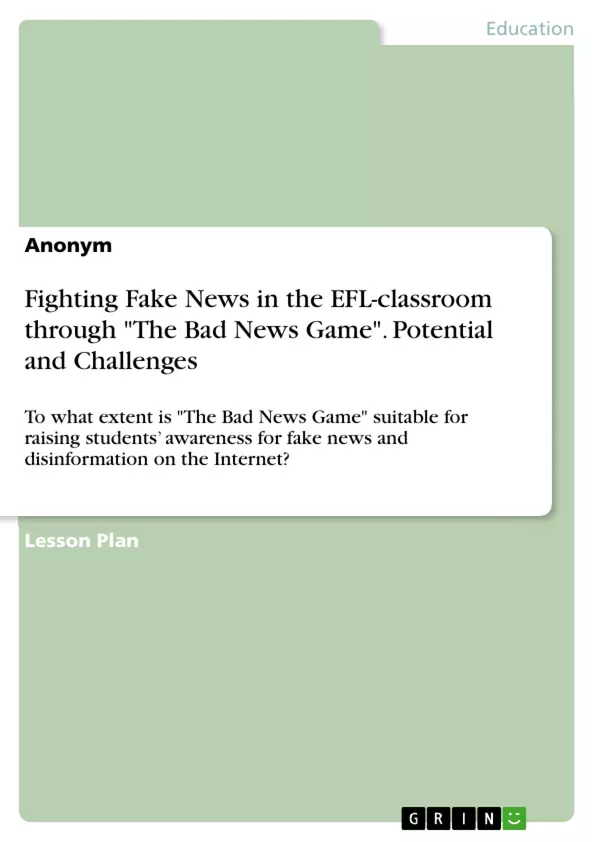This term paper seeks to investigate to what extent "The Bad News Game" is suitable to sensitize students to fake news and disinformation on the Internet through the presentation of a teaching unit consisting of one double lesson. The first part of the term paper addresses three empirical studies with a respective distance of one year, which deal with the game and its effect on the players. Afterwards, the theoretical second part will focus on the potentials and challenges in the EFL classroom, which serves as a transition to the teaching unit. The teaching unit will present a possible lesson design for English classes, developed with the core curriculum for the upper secondary school English lessons of the Hessian Ministry of Education in mind. Finally, the conclusion summarizes the results of the chapters.
"The Bad News Game" is an excellent choice for the classroom, as it addresses crucial manipulation techniques, and is well suited as a discussion starter to strengthen students’ media literacy. Besides, it improves resistance to disinformation, making it a good introduction to the complex topic. The students’ awareness for fake news and disinformation on the Internet can be raised with the help of interactive and narrative elements, that occur in the game, and encourage constructive discussion. The teaching unit, which comprises a total of 1 double lesson, serves to introduce the topic of fake news and disinformation and to get to know the prevailing problem as well as the linguistic characteristics. In addition, it is interesting to find out how students define fake news and whether they have encountered them before.
Table of Contents
- Introduction
- Literature Review
- Survey of Empirical Studies on The Bad News Game
- Get Bad News
- Game Theory
- Potential for the EFL-Classroom
- Challenges and Difficulties
- Embedding the Game in the Classroom
- Conclusion
Objectives and Key Themes
This term paper aims to investigate the suitability of The Bad News Game in sensitizing students to fake news and disinformation on the Internet. It will explore the game's effectiveness in promoting critical media literacy skills, particularly within the context of English language learning. The paper will analyze existing empirical studies, examine the game's potential for the EFL classroom, and propose a teaching unit for upper secondary school English lessons.
- Fake news and disinformation in the digital age
- The Bad News Game as a tool for media literacy education
- Empirical evidence of the game's effectiveness
- Potential and challenges of implementing the game in the EFL classroom
- Design of a teaching unit for upper secondary English lessons
Chapter Summaries
The introduction provides an overview of the challenges posed by fake news and disinformation in today's society, highlighting the importance of media literacy education, particularly for young people. It introduces The Bad News Game as a potential solution and outlines the paper's objectives and structure.
The literature review examines three empirical studies that investigated the effectiveness of The Bad News Game in enhancing awareness of disinformation online. The studies provide evidence that the game can significantly increase participants' ability to recognize and resist misinformation, by fostering a critical approach to online information.
The chapter on "Get Bad News" delves into the game's potential for the EFL classroom. It explores the game theory behind its design, highlighting its engaging and interactive nature. The chapter also discusses the challenges and difficulties of embedding the game within an EFL curriculum, considering factors such as language level, student motivation, and available resources.
Keywords
This paper examines the impact of The Bad News Game on media literacy skills, specifically in relation to fake news and disinformation. Key concepts include critical media literacy, misinformation, online manipulation, digital games, EFL classroom implementation, and the psychological inoculation theory.
- Arbeit zitieren
- Anonym (Autor:in), 2022, Fighting Fake News in the EFL-classroom through "The Bad News Game". Potential and Challenges, München, GRIN Verlag, https://www.hausarbeiten.de/document/1417824


